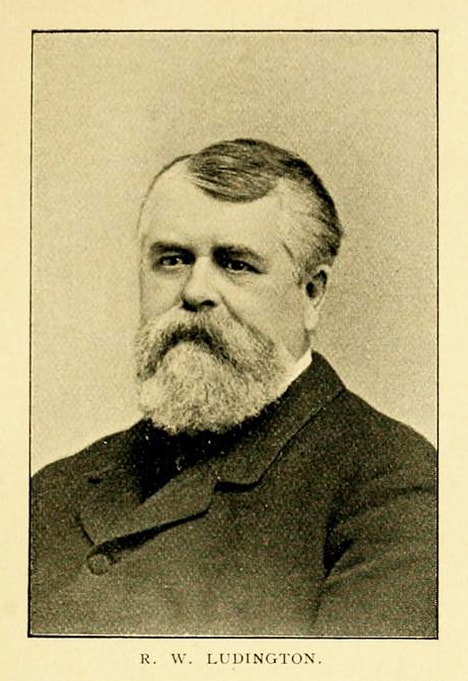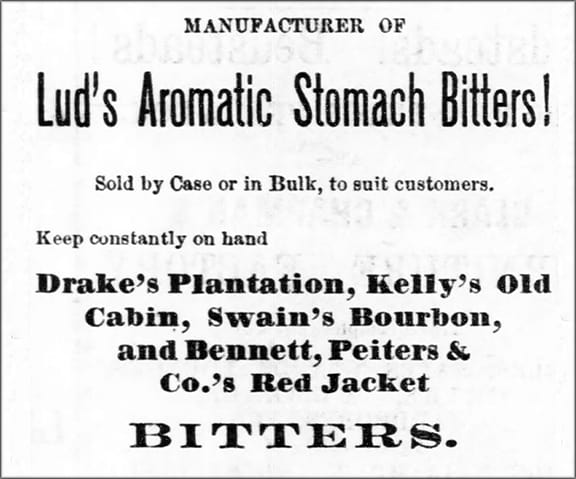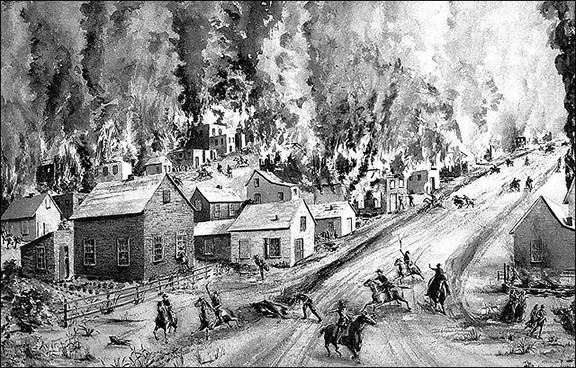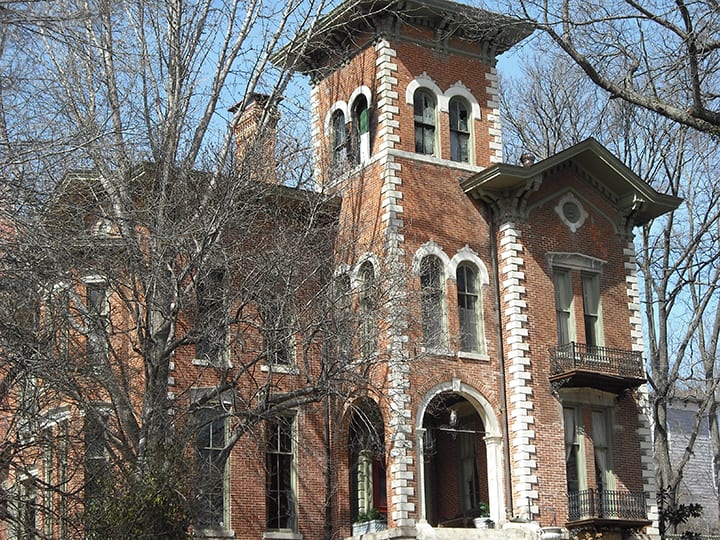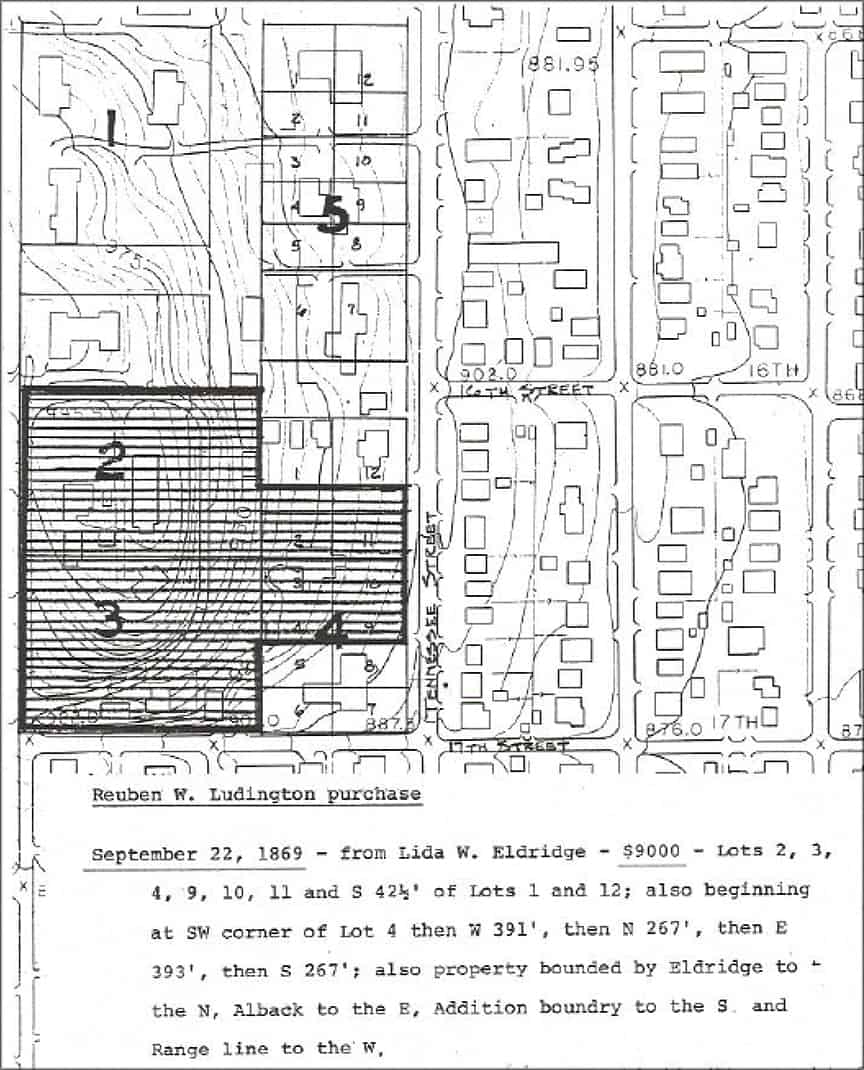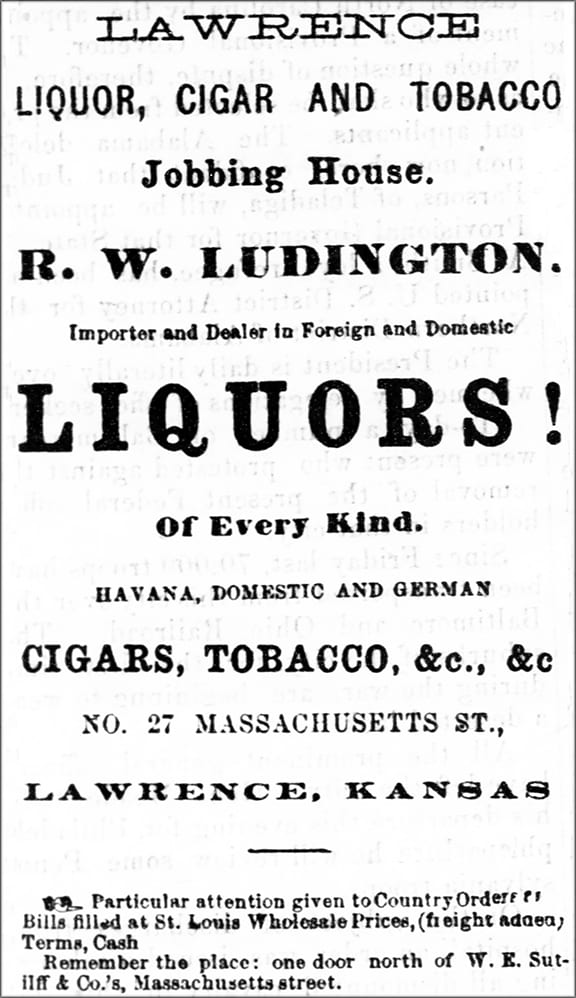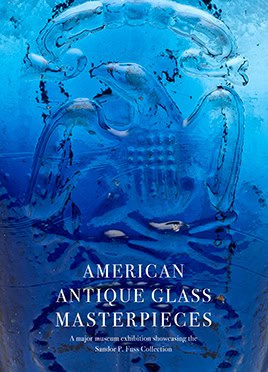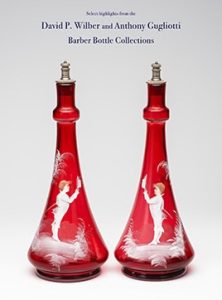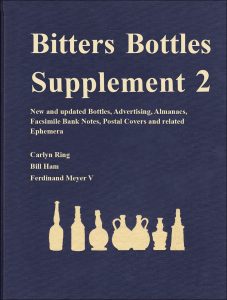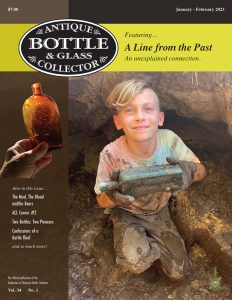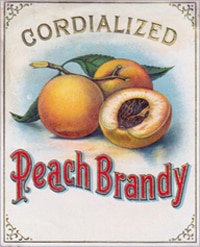Lud’s Aromatic Stomach Bitters – Lawrence, Kansas
Reuben Winchell Ludington
10 May 2015
![]() While poking around the internet this morning, which is something akin to looking at the sky with a telescope, I spotted a listing for a Lud’s Aromatic Stomach Bitters. Not recognizing the name, it immediately required a second look and a refocusing of my lens. You can see a portion of the listing below.
While poking around the internet this morning, which is something akin to looking at the sky with a telescope, I spotted a listing for a Lud’s Aromatic Stomach Bitters. Not recognizing the name, it immediately required a second look and a refocusing of my lens. You can see a portion of the listing below.
There is an incomplete listing in Bitters Bottles by Carlyn Ring and W.C. Ham, meaning obviously that there is no known bottle and little information. The listing:
L 130 LUDINGTON’S STOMACH BITTERS
R.W. Ludington, Lawrence, Kansas
Atlas of Douglas City (Kansas) 1873
While I find no reference to Ludington’s Stomach Bitters put out by R. W. Ludington in 1873 in Lawrence, Kansas, I can track down the Lud’s Aromatic Stomach Bitters, made by the same.
Reuben Winchell Ludington
Reuben W. Ludington was one of the true pioneer businessmen of Lawrence, Kansas and considered a Free-Stater, which were antislavery settlers in Kansas Territory in the 1850s. He was also another Mayor who made a bitters.
Ludington was born in West Springfield, Holyoke, Hampden County, Massachusetts on September 1, 1827. Both from New England, his father was Henry Ludington and his mother was Vilitty (Winchell) Ludington. They were described as well educated and connected deeply to history.
His father was an orderly sergeant in the War of 1812, enlisting for a soldier for a regular term, staying until the end of the war with an honorable discharge. He was in several engagements including an attempt of the British to capture New London, Connecticut. His grandfather, Daniel Ludington, was a Captain in the Revolutionary War, serving faithfully through the conflict for Independence. His grandfather, on his mother’s side, Elisha Winchell, was a Revolutionary soldier, holding the position of Lieutenant. The family actually has a record of the Winchell’s running back to 1293, when Robert Winchelsen was elected Archbishop of Canterbury. There is quite a bit more history here but that is another story.
Reuben W. Ludington, was educated in the common schools of New England receiving the equivalent of a business education. With school completed, he moved to Hartford, Connecticut and worked as a clerk and salesman for three years on the low salary of fifty dollars per annum which included board. He prospered and in 1849, he returned to Holyoke, married and started a store of his own which was reasonably successful. He also established a postoffice at Rock Valley and was the first postmaster.
After a time, Ludington bought the home formerly owned by his mother’s father, and there he continued the family gatherings which had been so notable during his grandfather’s lifetime. In the spring of 1857, he came to Kansas. His cousins, the Eldridges, were in Lawrence, and he visited them. Being pleased with the prospects, he decided to remain. I suspect he also saw the war clouds coming between the North and South and headed west.
Ludington next started a livery business (the old Eldridge house stable) having as a partner Col. S. W. Eldridge, but he soon sold to his partner, and opened a mercantile store on Massachusetts street. In Lawrence, he carried on the business of a merchant. The first listing for him I could find was in 1859 and an advertisement below in 1860, “R. W. Ludington, Importer and Dealer in Foreign & Domestic Liquors”. He was also a tobacco dealer selling “Every Kind of Havana, Domestic, German Cigars, Tobacco, &C.” He said he would sell his goods at Saint Louis prices with freight added. He asked prospective buyers to call on him first instead of going to Leavenworth, Kansas where freighting was twice the distance. Shipping was a much bigger deal back then.
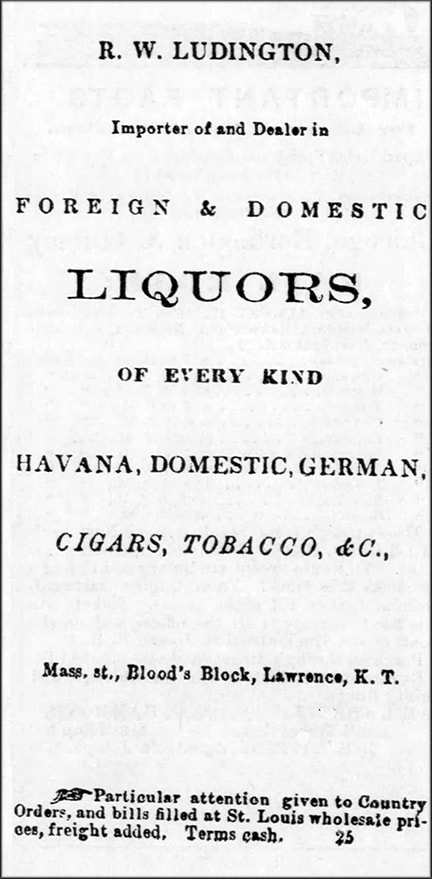
R.W. Ludington, Importer of and Dealer in Foreign & Domestic Liquors advertisement –The Topeka Tribune, Saturday, December 29, 1860
Quantrill’s Raid
The Lawrence Massacre, also known as Quantrill’s raid, was a rebel guerrilla attack during the American Civil War by Quantrill’s Raiders, led by William Quantrill, on the Union town of Lawrence, Kansas. The attack on August 21, 1863 targeted Lawrence due to the towns long support of abolition and its reputation as a center for Jayhawkers and Redlegs, which were free-state militia and vigilante groups known for attacking and destroying farms and plantations in Missouri’s pro-slavery western counties. Quantrill and a band of men had been meeting in the hills southeast of Kansas City and making forays into Kansas. Quantrill attacked Olathe one night and stole considerable property. One person was killed. Most of the raids were for plunder, but the raid on Lawrence on Aug. 21, 1863, according to the Rev. Richard Cordley, was deliberately for slaughter.
Fortunately, on the day of Quantrill’s raid, Ludington and his family were visiting in Massachusetts. He did lose two buildings and substantial stock entailing a loss of $30,000, most of it destroyed by fire. An attack was also made upon his house and a neighbor, Mr. Lowe, was able to save. Had Ludington been in the city he would probably have lost his life. It would take hime a decade to recover his wealth. On his return he sold his house and started anew in business.
In the spring of 1864, Ludington was elected mayor, succeeding George W. Callomore, who had been killed in the Quantrill raid. In his inaugural address he referred to the past history of the city, its trials and vicissitudes, and the losses which all of the citizens had experienced, but, at the same time, he declared his faith in the future city, recommended the enlargement of schools, the organization of a fire department and purchase of grounds for a cemetery (which resulted in the selection and beautifying of Oak Hill cemetery), also recommended the improvement of streets, and a vigilant system of military defense by the erection of block houses. Five of these block houses were put up, in order to protect the city against future raids. Under his administration good order was restored and general confidence inspired. In 1876 the city again had financial reverses and he was again elected mayor and re-elected in 1877. He succeeded for the second time in placing the city’s finances on a firm basis, and retired from ofiice, with the confidence of the entire citizenship.
Ludington also made the first plea for a new cemetery in his May 1864 mayoral inaugural address. He cited the need for a site with “sepulchral fitness for sacred reminiscences where departed friends could be remembered”. The landscape designer who worked on Oak Hill came from Ohio, and boarded with Ludington at his home, which still stands on Tennessee Street. It is known as the Ludington Thacher house and is a distinctive icon in Lawrence and is on the National Register of Historic Places. Here is an interesting story about a grand residence on Tennessee Street in Lawrence, Kansas. See the image below and read, 1613 Tennessee Street, The Real Story by Stan Hernly.
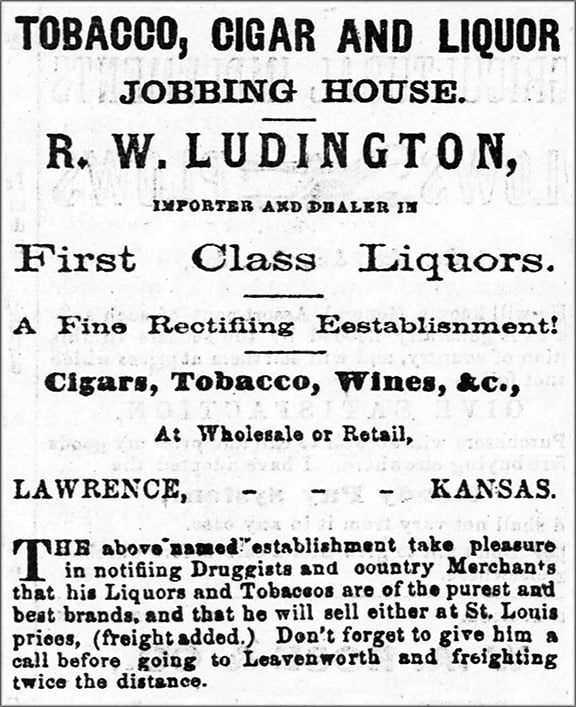
R.W. Ludington, Importer and Dealer in First Class Liquors advertisement – The Osage County Chronicle, Saturday, March 19, 1864
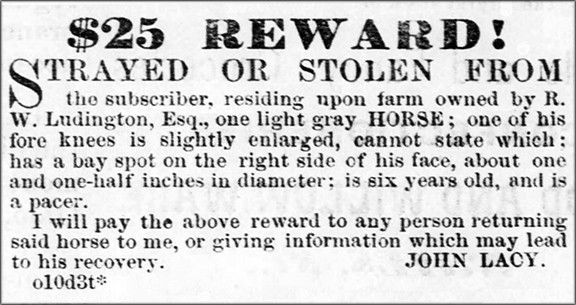
$25 Reward: Horse lost on Ludington Farm notice – The Daily Kansas Tribune, Wednesday, October 11, 1865
The Lud’s Aromatic Stomach Bitters makes an appearance in the below advertisement and only appears in 1867. That would explain the scarcity of information. By now Reuben W. Ludington is a distiller, rectifier and dealer in wines, liquors, bitters, lamp chimneys, coal oil and tobacco. He does say he is the manufacturer of the Lud’s bitters and that he would sell it by the case or in bulk. He really sounded like a big-time Chicago or St. Louis liquor merchant by now. He was even selling Drake’s Plantation, Kelly’s Old Cabin, Swain’s Bourbon and Red Jacket Bitters. This would be the liquor store to shop at in Lawrence! Unfortunately his Lud’s Aromatic Stomach Bitters did not sell. If I was his partner, advisor or advertising agent, I would have suggested using his full last name instead of “LUD”. Maybe he went locally by Lud, but certainly folks from afar may have not recognized Lud over Ludington.
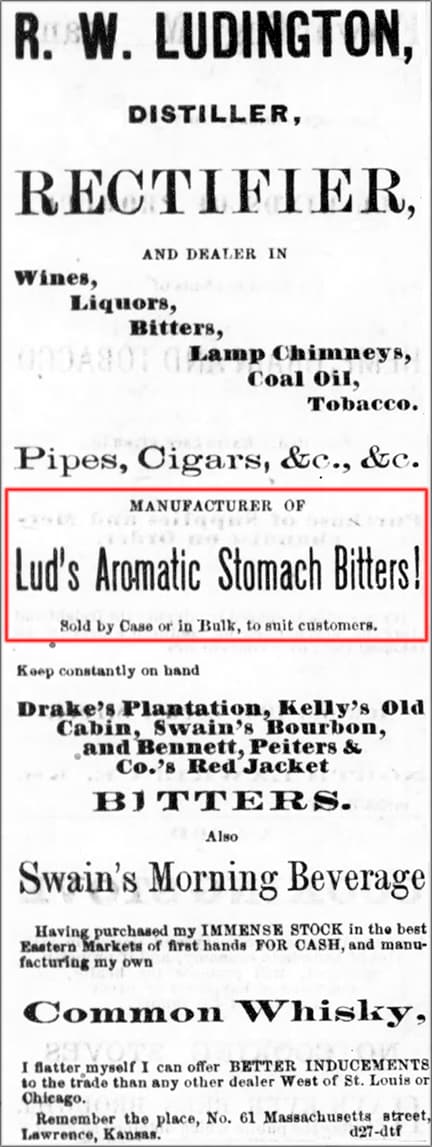
R.W. Ludington Manufacturer of Lud’s Aromatic Stomach Bitters – The Daily Kansas Tribune, Friday, April 12, 1867
As Ludington rebuilt after the Civil War, he went to old Franklin and bought a Methodist Church building, which he moved up to Lawrence and transformed into a store. The next year he built a three-story brick building, 25 x 80, at No. 707 Massachusetts street, and there continued business until I881, when he retired from the mercantile business. From I884 to 1893 he was a member of the wholesale grocery house of A. D. Craigue & Co., on North Tejon street in Colorado Springs, Colorado. Ludington spent his later years as a gentleman farmer and died on 13 October 1905.
During the war, while mayor of Lawrence, Mr. Ludington was a member of Company E, Third Kansas Militia, that saw service during the Price raid. He was a member of Washington Post No. I2, G. A. R. He was also affiliated with the Republicans, but later was a Democrat. Fraternally he was connected with Lawrence Lodge No. 6, A. F. & A. M.; Lawrence Chapter No. 4, R. A. M.; DeMolay Commandery No. 4, K. T., in which he held various offices. He was a stockholder and the last president of the Lawrence Street Railway Company, also served as a director in the Second National and Lawrence Exchange Banks, and has been a director in the St. Louis, Lawrence and Southwestern Railroad Company. Quite a man.
Select Listings:
1827: R. W. Ludington born in West Springfield, Holyoke, Hampden County, Massachusetts on September 1, 1827.
1849: May 10, 1849, Mr. Ludington was married to Miss Eunez B. Winchell.
1859: R. W. Ludington, Lawrence, Kansas – Kansas State Census Collection
1860: Advertisement (see above) R.W. Ludington, Importer of and Dealer in Foreign & Domestic Liquors advertisement – The Topeka Tribune, Saturday, December 29, 1860
1860: Wholesale Liquors, Cigars & Tobacco, R.W. Ludington, s. w. cor. Massachusetts and Henry – The Lawrence City Directory and City Mirror
1867: Advertisement (see above) R.W. Ludington Manufacturer of Lud’s Aromatic Stomach Bitters – The Daily Kansas Tribune, Friday, April 12, 1867
1878: On September 12, 1878, Judge Foster was married to Angie V. Ludington, who was a daughter of R. W. Ludington, a prominent citizen of Lawrence, Kansas. Mrs. Foster still survives, with two daughters, Beatrice and Lillian; they reside in a beautiful residence on the corner of nth and Harrison streets, and move in thebest society of Topeka. During the later years of Judge Foster’s life, the family traveled in many lands, in a vain search for health for the beloved husband and father. Although perfect recovery from his malady was not granted, his days were prolonged. He was permitted to pass away surrounded by his family and friends and in the city where he had gained so many legal triumphs. – Shawnee County KS Archives Biographies…..Foster, Cassius G. 1837 – 1899
1878: KALLOCH KEEPS A SALOON. At this time, amongst other occupations, he kept a saloon, where he compounded (with his own hands) mint julip, brandy smashes, cock-tails, and his own favorite beverage, “whisky skins.” The city records show that he took out license for his saloon for the years 1872 and 1878. Of the quality of his liquors, some of his patrons say they were bad, some say that they were medium, others that he kept good whisky. For himself, he always kept the best.
PUTS UP A JOB ON WASHINGTON LIBBY, OF CHICAGO, AND BEATS HIM OUT OF $8,000. BEATS OTHEB FRIENDS OUT OF A LARGE SUM OF MONEY.
In July, 1878, Kalloch was having some business transactions with R. W. Ludington, of Lawrence, Kansas, in which Kalloch was to pay Ludington $8,000. Ludington knew Kalloch too well to take his promissory note for that amount, but agreed to take a note, payable in one year after date, if he (Kalloch) would get it endorsed.
1888: R.W. Ludington, r. ne. cor. Winthrop and Connecticutt – Lawrence City Directory
1893: R.W. Ludington, farmer, r. 640 Connecticutt – A Directory of the City of Lawrence and Douglas County
1905: Ludington death. – Oskaloosa Independent, 13 October 1905
COL. LUDINGTON DEAD.
Lawrence, Kan., Oct. 7.–Col. R. W. Ludington died this morning about 4:30 o’clock as a result of an apoplectic stroke which rendered him helpless the first part of the week.
In 1857 he came to Kansas. At the time of the Quantrell raid his two buildings and stock were destroyed by fire. An attack was also made upon his house, for he was a pronounced free state man. Mr. Ludington bought the Methodist church building at Franklin, following the raid, moved it to Lawrence, and resumed business. The next year he built the three story brick building at 707 Massachusetts street, Eldridge hall, in which he always owned a large interest. He continued in business here until 1881.
May 10, 1849, Mr. Ludington was married to Miss Eunez B. Winchell, who was born in West Springfield, Mass., and was a cousin. Mrs. Ludington and two children survive, Wilbur Ludington and Mrs. C. G. Foster, of Topeka. In the spring of 1864 Mr. Ludington was elected mayor of Lawrence succeeding Geo. W. Collamore, who was killed during the Quantrell raid. In 1876 the city again had financial reverses and he again elected mayor and re-elected in 1878.

